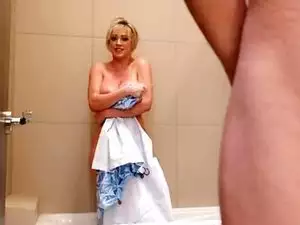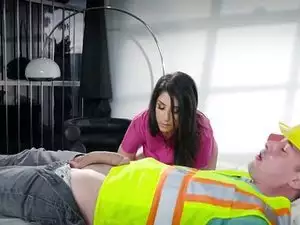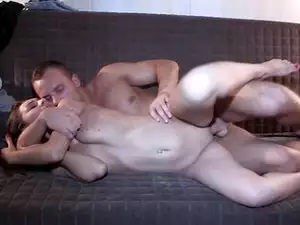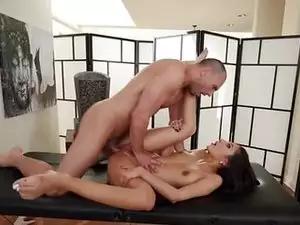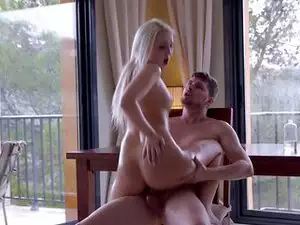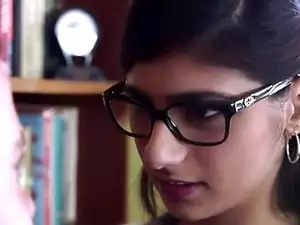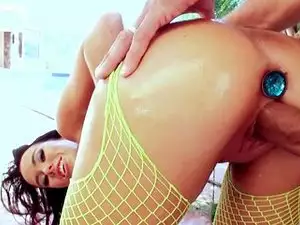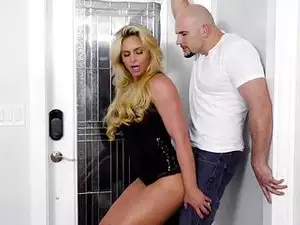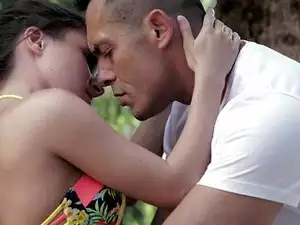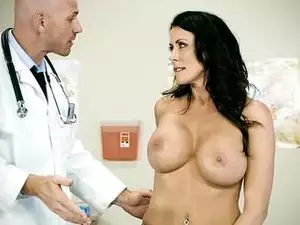The Three Signs - Book 4 - LisaChapter 8: I’ll Make You Happy free porn video
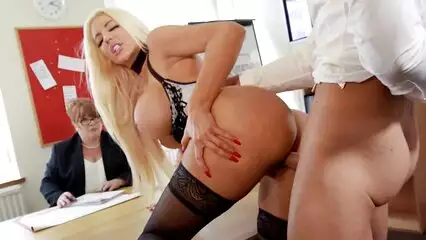
The three of us spent a delightful morning in bed; I guess that sort of made up for not going down to the park. After lunch, we were all up in the Studio; the two guys from Midnight Oil arrived mid-afternoon, and we took a break to discuss possible songs for the end of Rocktober gig we would be having with them.
“This sure is a cool setup you guys have here,” Martin Rotsey said.
We knew the guys from Midnight Oil pretty well; like with most of the major Aussie bands. We all sat down to plan what we could do as combined songs for the gig at the end of the month.
“We saw you the other week with Chisel and the Divynils,” Peter said. “You final set was pretty mind blowing; considering that you had probably only rehearsed things together earlier that day.”
“I guess at a minimum, we should think about what to replace the two Chisel songs with two of yours,” Phil said. “Any suggestions?”
“We sometimes do ‘Power and the Passion’ and ‘US Forces’ as encores,” Martin said. “You guys don’t have any problems with the political nature of most of our songs?”
“Problems? Not in the slightest; we have our own bunch of political songs too,” Phil said. “We were thinking of having one of them in the final set, ‘Invasion Day’, if you guys don’t mind.”
“That’s a great song, we loved that when your album came out,” Peter said. “We’d love to do that one with you. Wasn’t there another about sex abuse from Catholic priests? That was pretty controversial, if I recall.”
“You’re not wrong! We had someone try to burn our place down because of that. I think if we did that, 2SM, who are sponsoring the whole events this month would not be happy!”
We discussed possible songs to include in our sets; we decided to include a number of the songs from the ‘Songs of Injustice’ album, even the controversial ‘That Hurts, Father’, in spite of any concerns 2SM might have about allegations of misconduct against the Catholic Church. Mary Beth made a note to contact the Dyvinyls, to make sure they were happy with us having some potentially contentious songs in the sets. Before the two guys left, we recorded copies of ‘Invasion Day’ and ‘Nutbush’ on some cassettes for them. We told them they were more than welcome to come around any evening with their whole group if they wanted to rehearse with us.
Sunday my ankle felt sufficiently recovered to go sailing; both Don and Ian were glad that I was there, and my ankle was better. As he had promised Lisa, she took the helm before the start of the race; manoeuvring us around in the pre-start preparations, allowing us to check the actual wind strength and direction. We planned our starting tactics; Don took over the helm at the two-minute gun, but at various times through the race she relieved him, taking the tiller. We sailed fairly well; enough to cross the line in first place, but not well enough to get better than forth on handicap. Still, it was a great day out on the water, Lisa really enjoyed her time on the helm, and we were both in good moods as we drove home.
“Have you thought any more about getting your own boat?” she asked me.
“Not a real lot,” I said. “Things have been busy over the last few weeks. I’ll see if I can pick up a copy of ‘Boat Trader’ tomorrow, and we can look through it tomorrow night, if you want.
“That would be so cool; we can see what sort of boats are available, anyway. When would it be a good time to get one?”
“Maybe we finish this season sailing with Don and Ian, and get something during the winter. We could familiarize ourselves with the boat before the next season starts, make any repairs that would be needed.”
“I was speaking with two of the people who organize a lot of the cruising weekends, Michael Maher and his wife, Andrea about us possibly getting a boat and joining in on some of the cruises,” Lisa said. “They were excited about having another couple with them. They said if we wanted to come along one weekend, we could ride on their boat, or with some of the others.”
“That might be fun; don’t ask me when we would have time; I’m sure we are going to be busy with gigs and tours all over the Christmas break. And I guess we have to start thinking about the next album, too.”
“God, how do we find the time to fit everything in?” she asked. “It never stops!”
“I know. I’m hoping that next year, I won’t have as many classes to attend, maybe one each semester. But my lecturing and tutorial load will increase, I’m sure. At least with the thesis, it will just be wrapping the report up, making sure I’ve covered everything properly, then preparing for my dissertation. I’m hoping to get that done by the middle of the year.”
“When will you officially become ‘Doctor Morris’? Sometime later next year?”
“With luck, I might make the October graduation ceremonies,” I said.
“So this time next year, I can be fucking a doctor? Cool, you can write me a prescription for daily injections of sperm.”
“You know I’m not going to be that kind of doctor ... But I will give you daily sperm injections. In fact, I can do that right now.”
“As long as you have enough to inject me, Fiona and Chrissy. I wonder if there’s a special diet I could put you on to keep your stamina up, make sure your sperm production is at its maximum. I do know that different foods and drinks can change the taste of it.”
Monday morning started with one of those annoying, time-wasting meetings, the School of Electrical Engineering meeting. As much as I disliked attending them, it was a necessary evil, it came with being a member of the academic staff. At least Michelle managed to make my attendance at the various meetings – Computer Science Departmental meetings, School meetings, and the Engineering Faculty meetings as painless as possible. She had all of the minutes and papers for each of them filed; and made sure I was prepped for each meeting several days beforehand. At least when I was asked for my comments on whatever proposal was being discussed, I could respond intelligently, and actually add some value to the meeting.
I had made sure I arrived a bit earlier than usual that morning, I spent three-quarters of an hour reading through all the material on the agenda. The only item that really impacted on me directly was a proposal to split the main second year computer science subject, 6.621 Computing II into three subjects, Computing II A, B and C. IIA would be on structured programming, data structures and an introduction to computer architectures and operating systems. IIB would be assembler programming and digital logic design, while IIC would be more on complex data structures, file systems, pattern matching and similar topics. These were really intended for students pursuing a computer science degree, rather than an electrical engineering degree, and would give them a better grounding before their third year subjects.
I felt that the proposal had a lot of merit (well, considering I had a fair degree of input into the proposal... ), it would mean I would have more teaching responsibilities, but I felt it would give students a deeper understanding of concepts at an earlier stage than the way the course had been structured until now. The purpose of having this on the agenda today was to get the formal approval of the changes before getting faculty approval. Once that was done, getting the official signoff from the Professorial Board (which fortunately I had nothing do to with!) was a pretty much guaranteed.
A few minutes before 8:00, I collected my papers for the meeting, and walked up the stairs to the lecture room on the 4th floor where the meeting was to be held, and sat in the middle of the room, with Claude and David. Right on eight, Professor Rees called the meeting to order.
“Welcome to the penultimate School meeting for this year,” he said. “Fortunately, there isn’t too much that we need to get through this morning, so I will try to make this as brief as possible. But before we get into the formal agenda, there is one piece of happy news that I want to share with everyone. It is always good for the School when one of our staff has an article published in an academic journal, it raises our profile, both within the University, and the world at large.
“I am very pleased to announce one of our younger staff members has had his first professional article published, Will Morris has an article coming out in the latest Journal of the Australian Computer Society. It covers the work he has done with time synchronisation on our data network, and linking that synchronization back to the atomic clocks run by the National Institute of Standards and Technology in Boulder, Colorado. I have read the article, and not only is it highly informative, but very readable. I don’t believe I’ve ever read about the linkage between medieval farmers planting their crops, monks knowing when to pray, navigation and cartography in the golden age of exploration, and the avoidance of train collisions; all within the introduction to an academic article. But Will explained the background to timekeeping and standards, and showed how successfully he implemented a system here. Congratulations, Will, on the first of what I am sure will be many publications in your career.”
I felt slightly embarrassed as everyone in the room applauded; I didn’t feel that I could really take credit for what Professor Rees mentioned in the introduction to my article; most of that came from Mary Beth, Patrick and Chris. But it felt good to get the acknowledgement of my peers.
With that out of the way, we went through each item on the agenda. A proposal to beef up photovoltaic cell research, which Doctor Green spoke about. Everyone agreed to that, particularly since his research was considered cutting edge in the country. There was a proposal to upgrade the equipment in the two electrical power systems labs; something that I thought was well overdue. The changes to the second year computer science subjects were discussed, and Professor Allen was asked about predictions on enrolment numbers and class sizes. He asked me to give my thoughts on how our revamped first year subject was working out, fortunately he had warned me that he would be doing this, so I could give a reasonably intelligent response. Colin Stapleton, the executive assistant for the school expressed concern about whether we had the resources to handle the number of students wanting to take Computer Science subjects.
“If the numbers keep increasing the way Mr Morris has projected, then we are going to have real problems finding lecture rooms large enough; there are rooms up in the Central Lecture Block, but demand for those is already high. Do we have enough tutors? What about laboratory facilities? It’s not just the physical space I’m worried about, or staff numbers, although those are real concerns. Do we need to budget for additional computer equipment, terminals and printers? What about the disk storage on our main teaching systems?”
“We have already been working on that,” Murray Allen said. “I’ll have a proposal for upgrading our hardware resources for the next meeting; plus a staffing plan. But I think we will need to hire at least an additional five or six tutors for next year.”
“That’s good you’ve been thinking about that, Murray,” Professor Rees said. “Can you have your proposals to Colin a week or two before the next meeting?”
With that agreed to, it was onto the next agenda item; getting our measurements calibration laboratory re-certified from the National Association of Testing Authorities. I wasn’t completely aware of what they did in that lab; but I understood the School offered a service of calibrating electrical measuring equipment for various other bodies, as a fee, of course. One of those things I had missed out on by not completing the final two years of my Electrical Engineering degree.
That pretty much wrapped up the meeting; time for me to go back to my office, and get my notes to the morning’s Computing I lecture. As I was about to leave the meeting, Professor Rees asked me to stay back after the others had left.
“Will, I meant what I said about your article; congratulations on getting published, as I said, I’m sure that will be the first of many such articles you will write over your career. I also want to personally thank you for all the work you have done here, lecturing, tutoring, helping with the first year students. You may be surprised to know, but I get a lot of comments from students and other members of the staff about how well you run your classes and tutorial sessions.”
“Thank you, I think I learned from some good teachers here,” I replied.
“It’s more than that, Will,” he said. “I get to talk to a lot of the students, those who do well, and those who want to transfer out or have failed a subject. All of them, at least the ones who took your classes, commented on how helpful you were, that you would take the time to go over concepts and explain things to them. They say you have a real empathy with them, have that ‘common touch’ that makes it easy for them to approach you. Try not to lose that. If the way you wrote that article is any indication of how you teach and explain things in your lectures, then I can understand why your students think so highly of you.
“I’m sure you recall from when you were an undergraduate student here, how at the end of each semester we would ask all students to complete an assessment form for each subject. How we felt their lecturer performed, tutors, the subject material, pacing, all the feedback that we use to make sure we are doing our teaching jobs to the best of our ability. I am pleased to say that you get the top rating from your students, you have got that from when you first started tutoring. Just keep up the great work; I’m sure you have a promising future here.”
I thanked him for his comments, and said I try to treat the students that I have the way I would have wanted to be treated when I was a student.
“And by the way, since you’ve had your first article published, come to lunch tomorrow in the Senior Common Room club; my treat. It’s a tradition at the university, something to celebrate a ‘rite of passage’ for an academic. It will be a ‘formal’ lunch, by the way.”
‘Formal’ – I would have to get out my academic gown, so tomorrow I would have to wear a white shirt and tie underneath the gown. I would be one of the few at the lunch with just a bachelor’s gown and hood; once I had obtained my PhD I would swap out the gold / maize coloured hood for a scarlet / gold colour. The gown was a slightly different style, as well. Instead of the flat mortar-board cap, I would wear what they called a ‘tudor’ bonnet, with a red cord trim. All of that looked rather fancy, I thought.
I told him I would be there for lunch; and that I had to get ready for the Computing I lecture. He shook my hand again, and I left, heading to my office, and then down to the main lecture theatre.
The next day, in the Microprocessor Systems lecture, Doctor Maxwell handed out the final assignment for the subject.
“As you know, there isn’t a final exam in the traditional sense for this subject,” he said. “What there will be is a final assignment, you will write a five thousand word report, basically comparing the IBM Personal Computer and the Apple II computer. I want you to address the design of the hardware and software of the two systems, ‘compare and contrast’, I believe is the term. Give me your opinions on what are the advantages and disadvantages of each design, what you would have done differently had you been in charge of designing each product, and which one of the two you feel is the better product, and why. I expect your opinions to be backed by evidence, not just an opinion you’ve pulled out of thin air. It will be due by the Friday of the first week of the exams, so that will be November 12. No exceptions will be given for lateness. This will comprise up to thirty-five percent of your final mark in the subject.”
He then handed out a single sheet with the requirements for the report. It looked like an interesting assignment; we had discussed various aspects of this exact topic over several lectures during the semester. The big challenge would be working out how to structure the report, and what conclusion I would draw. I personally felt the IBM product was the superior one, there were just some things about the Apple that I didn’t like, starting first of all with their mis-appropriation of the Beatles recording company’s name; I had no idea how the courts allowed that to happen. And then there was the way they named it using the back to back square brackets, the “Apple ][“ rather than a Roman II. I thought it was all rather ‘precious’. Then there was the very aggressive anti-competitive business approach, preventing competitors from making compatible products or upgrades that weren’t made by Apple. I would have to make sure that any conclusions that I reached were based on fact, and not my own prejudices or dislike of the growing culture of Apple being a completely new way of ‘doing computers’. Some of the Apple fan boys acted like they had been ‘born again’ at some tent revival meeting.
I had plenty of time, over four weeks to finish the report, so I planned out how I would tackle the project. I decided that this evening I would start, and summarize the technical specs of each machine. Then I would have to read up again on the standard operating system used on each machine, PC-DOS on the IBM, and AppleDOS on the Apple.
The lunch in the Senior Common Room club was excellent; I had only been in there a few times; twice a year there was a formal ‘School Luncheon’; all of the staff in the School would attend, academic dress was required. It had the atmosphere of a stuffy gentlemen’s club, or how I imagined a formal dining room for faculty at either Oxford or Canterbury University might be. But, I was being taken out to lunch to celebrate the publication of my first academic article. I tried playing it down, but secretly inside, I was very pleased, very excited. As one of the others said, it was a ‘rite of passage’ in anyone’s academic career, getting published in reputable journals was almost essential.
At the lunch, Doctor Dunworth presented me with a specially printed and framed copy of the article; there was a small brass plaque on the bottom, giving the date of publication.
“We can get that mounted on the wall of your office,” he said. “You’re a member of the ACS, aren’t you?” I nodded. “So you get the subscription to their journal.”
I was a full member of the Australian Computer Society, as well as a ‘student member’ of the Institute of Engineers (Australia); once I had obtained my PhD, then I would qualify as a ‘graduate member’. Even though I wouldn’t hold an engineering degree, getting a postgraduate degree from an Engineering faculty was considered sufficient to meet their academic requirements for membership. Not that belonging to any of these professional organizations would give me any sort of career advantage, but it was one way to stay abreast of developments across industry. Plus, being a faculty member of the School of Electrical Engineering, it looked good to be a member of the appropriate professional body. I guess from some sort of University PR or marketing sense, things like that might carry some weight. Not that it had any real impact on what happened in lecture rooms, or how we actually taught subjects to the students.
When I returned from the Computing I tutorial class, I started summarizing some of the key features of the microprocessor chips used in both the Apple II and the IBM PC. For the life of me, I couldn’t understand why the IBM design engineers went with the crippled version of the Intel 8086 processor, using the stripped down 8088. Maybe some cost-cutting pencil dick accountant felt that saving money with a lower priced chip, and only using an 8-bit data bus would give the machine a competitive advantage. Personally, I would have gone with the full-blown 8086, and included the 8087 math coprocessor for good measure. I guess that’s what happens when you let accountants dictate technical specs.
Not that I felt the 6502, used in the Apple, was any better. It also had an 8-bit data bus, and a 16-bit address bus. Very few registers though; a single accumulator, two index registers, and a stack pointer. The 8088 on the other hand had eight 16-bit registers, four of them could be used as eight-bit registers. With a built-in hardware stack, I felt it was a far more sophisticated processor design, but certainly not as powerful as the Motorola 68000 chip.
Time to put my papers away, I headed down to Anzac Parade to meet Mary Beth for dinner. The work on the assignment could wait for another day.
Each night we spent some time working on the songs for the ‘end of Rocktober’ gig, things were starting to take shape. Not only did we have to come up to speed with the two Oils songs that would be in the final set, but we were playing some of ours that we hadn’t played for several years, and since Megan, Jillian and Tracy (Mann) were no longer with us, we had to revamp the arrangements. On the next Saturday, the guys from Midnight Oil came around to rehearse with us. Mark and Chrissy from the Dyvinyls turned up as well for about an hour before they had to leave for the gig they were doing that evening. At least all of us had a chance to play through the six songs that would be part of our combined final set.
We were starting to sound reasonably good together; it wasn’t quite as good as with Chisel playing with us, but it was still early days. At least we still had two weeks before the actual gig. Once everyone else had left, we all sat around, talking about new songs that some people were working on. We needed to start thinking about our next album, at least have a number of songs ready for recording in January.
“Do we want a theme for this one?” Paul asked. “Genre? Covers or originals?”
“I think we should stick to the pub blues style,” Phil said. “Those ones go down well live. Could we open with ‘Time is Tight’, then into ‘Nutbush’; they are working well as our opening songs. We probably need another blues classic to blow people away with, any thoughts?
We kicked around a few ideas, until Bruce came up with a Robert Johnston classic, ‘Sweet Home Chicago’.
“Do you remember that part from ‘The Blues Brothers’, in the ballroom, before that final extended car chase sequence,” he said. “I reckon we could do even better than that.”
A pretty ambitious claim, I thought but it might be a good track to close out the album. Could we get Allison, Fiona and Mandy all singing it together? That would sound pretty amazing. We spent an hour working on the arrangement; I thought it sounded pretty rough, but the others were confident we could knock it into shape. Garry had a new song that he was working on; he played it through for us; it sounded pretty good. The lyrics still needed some work, but it had lots of promise. The same with a song that Fiona, Allison and Mandy had been working on. We felt that we were getting there; Mary Beth said that George and Harry had been working on some new songs for us as well.
Time for us to start planning our summer calendar; I blocked out the week of December 13 to 17, when Peter Baldwin had mentioned the ALP Strategy Meeting that he wanted me to attend. Apart from that, and the Christmas / Boxing Day commitments, we were pretty much free from mid-November through to the end of February. Well, with one exception; Garry had some news, he and Jenny had decided to get married during the first week of January.
“Congratulations, Mate, you kept that pretty quiet!” I said. “Where’s it happening? What’s the deal? Do you want us to play for the reception?”
Garry gave us all the details; he said he had only asked Jenny the night before; they hadn’t really worked out too many details; but the wedding would most likely be at the church Jenny’s family went to up at Dural.
“We’d like you all to play, but you can skip ‘I Knew the Bride’,” he said.
“What about we play ‘You Never Can Tell’?” Andrew suggested. “A good Chuck Berry one. Sure, it talks about a ‘Teenage Wedding’, but ... C’est La Vie’.”
We all groaned at Andrew’s bad pun, but it was a good suggestion. Another song for us to work on; but it was all for a good cause; we worked out the chords, and tried it with me singing.
“Can we try that pitched down a bit? What about in E?” I said, after I struggled with the first verse.
“Just squeeze his balls, Lisa,” Paul said. “He’ll be able to get that high!”
“I don’t think so,” Lisa said. “I might damage them, and that would be a tragedy!”
We transposed the music from G to E; and it was much easier for me to sing.
It was a teenage wedding, and the old folks wished them wellYou could see that Pierre did truly love the mademoiselle
And now the young monsieur and madame have rung the chapel bell
“C’est la vie”, say the old folks, it goes to show you never can tell
“Do we want to try an arrangement similar to ‘Pay Me My Money Down’?” Paul asked. “Let each person take their own solo break, that way we can really stretch it out.”
We spent about thirty minutes working on an arrangement for the horn section; I worked up a suitable piano break to fit in between parts; Fiona and Mandy came up with a very hot duet. Meanwhile Lisa worked with Garry and Jenny, coming up with a pretty wild set of dance moves for them.
“It’s not the traditional bridal waltz,” he said. “Maybe we can fit that in right afterwards? Do it as a fancy exhibition dance?”
“Okay, let’s take it from the top, you two show your style,” Phil saidl
I thought we sounded pretty good for the first time we tried the song; Garry and Jenny looked good dancing; apparently they had been taking dance lessons, that combined with Lisa’s choreography worked well. Mary Beth recorded our performance on a cassette for them to practice; at a later stage we would work out what other songs they would want us to play. As we took a break, Garry motioned me to one side.
“I do have another favour to ask of you, Mate,” he said. “I would love to have you as my best man, I can’t think of anyone else I would want by my side as I get married.”
“Not a problem, Mate, it would be an honour,” I replied. “You can tell Jenny that I will make sure you don’t wimp out at the last moment!”
That pretty much wrapped up a very productive rehearsal session; once the others had left, Lisa, Fiona and me headed up to the ‘Longy’ for dinner. Fiona and I had missed our regular ‘Friday night date’ the previous night, as we were at a gig at Millers Manly Vale.
“So, what did you think of their announcement?” Fiona asked once we were at our table. “It came as a bit of a surprise; I mean, they’ve been living in their own apartment since January, but getting married...”
“They do seem very happy about it,” Lisa said.
“The only surprise for me is that they didn’t announce it earlier; much earlier,” I said. “I think Garry’s been wanting to get married, settle down, have a bunch of kids; that’s always been his intention. I think Jenny wasn’t completely sure he was the one she wanted, but I guess she’s come around to that now.”
Sunday’s race was a heat of the Retriever Trophy; once again Don had Lisa take the helm before the start of the race and on the downwind legs, when Ian and I were trimming the spinnaker. Seeing her sitting there, her hand resting lightly on the tiller and her eyes focussed on the sail tell-tales reminded me of Lori’s helming style. She barely appeared to grip the tiller, it was like she was just resting her fingers on it.
On the drive home, I asked her about her helming style, why she barely gripped the tiller. She explained that’s what Don told her to do, that way she could feel the pressure of the water on the rudder, and not having the boat fighting the water.
“Every time you push the tiller against the flow of water, it’s like you are putting your foot on the brakes,” she said. “Sure, there are time when you need to put the helm over, but most of the time, you want no pressure on the rudder. If you have to constantly use the tiller to keep the boat headed straight, then the sails aren’t balanced, they are somehow trying to turn the boat to windward or leeward.”
What she said made sense to me; I can recall from watching Lori when she would be helming the boat, she was always calm, relaxed, not fighting the tiller. But her style certainly paid off; and it appeared Lisa maybe just as good as Lori was steering a boat. She seemed to have the right touch, she was always aware of the sail trim. I had a feeling Don was training her to take over as our main helmsman (helmsperson?)
ProposedMid-October, 1982
For Monday’s Programming Clinic discussion I had arranged for Garry to come and talk to the group about ‘real world programming’. I wanted him to explain how working as a professional programmer involved a lot more than just writing code; getting into the design and specification process, testing, quality assurance processes. I was meeting him for lunch at the bar at the Anzac Parade end of the Campus.
- 04.06.2021
- 37
- 0



